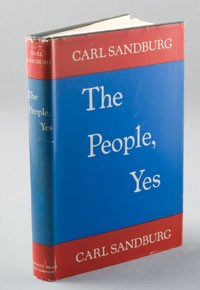
The Depression years provoked in Sandburg a profound desire to console “the people of the earth, the family of man,” and to lift the hopes of the people. Sandburg relinquished his Chicago Daily News job in 1932 to devote his full time to writing biography and poetry; he began to take a “detour” from work on the last stages of Abraham Lincoln: The War Years to write a long, innovative poem based in part on the lessons he had learned from Lincoln and American history. The People, Yes, an epic prose-poem, is in many ways the culmination of Sandburg’s work as a poet and is believed by Lilian Sandburg to be his favorite work. He crafted it over an eight-year period, fusing the American vernacular with the details of history and contemporary events. Sandburg’s immersion in the Lincoln era had given him an informed sense of history, and he saw striking parallels between Lincoln’s time and the Depression years. Believing that economic inequity lay at the root of all social injustice, from labor conflict to racial and civil strife, he responded to the economic and social upheavals of the 1930s with The People, Yes. Carl Sandburg, The People, Yes, 97 |
Last updated: April 14, 2015
